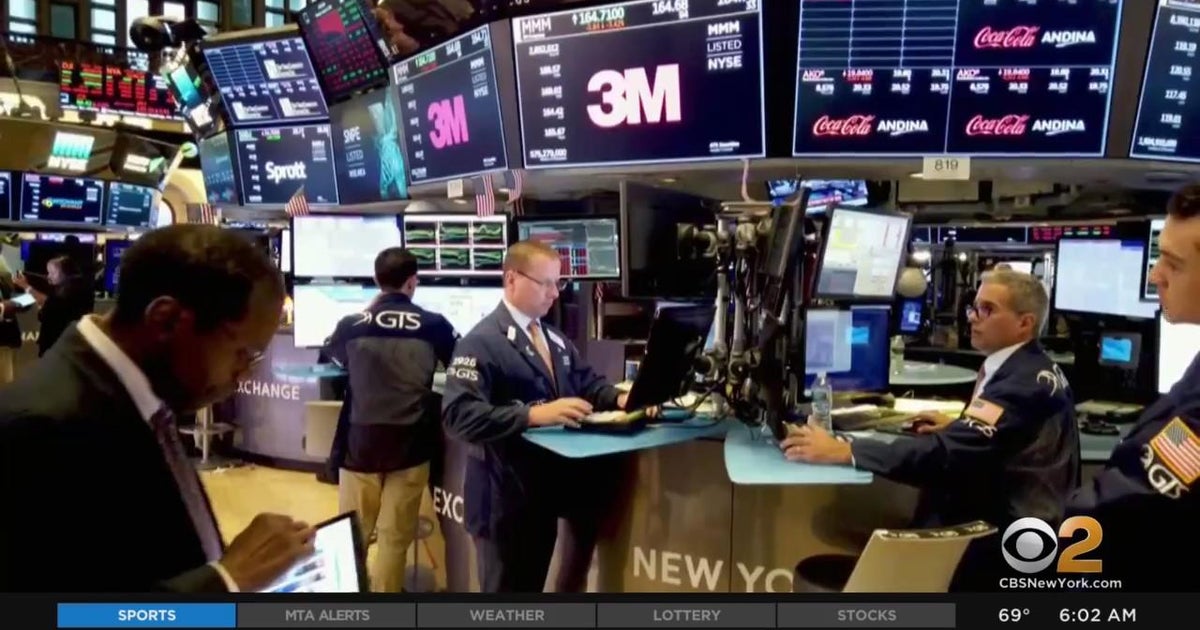Stocks Plunge Amid Rising Tariff Fears & Economic Uncertainty – Is Recession Looming?
The global stock market experienced a sharp decline on Monday, with major indices such as the Dow Jones Industrial Average and the S&P 500 plummeting to their lowest levels in several months. The market's reaction to rising tariff fears and economic uncertainty has sent shockwaves throughout the financial community, leaving many investors wondering if a recession is imminent.
The recent decline in the stock market can be attributed to several factors, including the ongoing trade tensions between the United States and China. The ongoing trade war has led to increased tariffs being imposed on imported goods, which has resulted in higher costs for American businesses and consumers. The impact of these tariffs has been felt across various industries, including agriculture, manufacturing, and technology.
One of the most significant concerns among investors is the potential impact of the ongoing trade war on the global economy. The World Trade Organization estimates that the ongoing trade tensions between the United States and China could lead to a 0.5% decrease in global economic growth by 2020. This could have a ripple effect on other economies, including those in Europe and Asia, which could exacerbate the economic uncertainty.
Another factor contributing to the decline in the stock market is the uncertainty surrounding the economic outlook. The recent decline in business investment and consumer spending has led to concerns that the economy may be slowing down. This has resulted in a decrease in investor confidence, leading to a sell-off in the stock market.
Factors Contributing to the Decline
The decline in the stock market can be attributed to several factors, including:
• Rising Tariff Fears
• Economic Uncertainty
• Decrease in Business Investment
• Uncertainty Surrounding the Economic Outlook
Rising Tariff Fears
The ongoing trade war between the United States and China has led to a significant increase in tariffs being imposed on imported goods. The tariffs have resulted in higher costs for American businesses and consumers, which has led to a decrease in demand for certain goods. The impact of the tariffs has been felt across various industries, including agriculture, manufacturing, and technology.
One of the most significant concerns among investors is the potential impact of the ongoing trade war on the global economy. The World Trade Organization estimates that the ongoing trade tensions between the United States and China could lead to a 0.5% decrease in global economic growth by 2020. This could have a ripple effect on other economies, including those in Europe and Asia, which could exacerbate the economic uncertainty.
Economic Uncertainty
The decline in the stock market can also be attributed to economic uncertainty. The recent decline in business investment and consumer spending has led to concerns that the economy may be slowing down. This has resulted in a decrease in investor confidence, leading to a sell-off in the stock market.
Some of the key indicators that point to economic uncertainty include:
• Decrease in Business Investment
• Decrease in Consumer Spending
• Increase in Unemployment Rates
• Decrease in GDP Growth
Decrease in Business Investment
The decline in business investment has been a significant contributor to the decline in the stock market. Businesses have been holding back on investments due to uncertainty surrounding the economic outlook. This has resulted in a decrease in demand for certain goods and services, leading to a decline in revenue for companies.
Some of the key industries that have been affected by the decline in business investment include:
• Technology
• Manufacturing
• Energy
• Finance
Uncertainty Surrounding the Economic Outlook
The uncertainty surrounding the economic outlook has been a significant contributor to the decline in the stock market. The recent decline in business investment and consumer spending has led to concerns that the economy may be slowing down. This has resulted in a decrease in investor confidence, leading to a sell-off in the stock market.
Some of the key indicators that point to economic uncertainty include:
• Decrease in GDP Growth
• Increase in Unemployment Rates
• Decrease in Consumer Spending
• Increase in Business Debt
Can a Recession be Looming?
The recent decline in the stock market has led to concerns that a recession may be looming. However, it's difficult to predict with certainty whether a recession is imminent.
Some of the key indicators that suggest a recession may be possible include:
• Decrease in Business Investment
• Decrease in Consumer Spending
• Increase in Unemployment Rates
• Decrease in GDP Growth
However, other indicators suggest that a recession may not be imminent. For example:
• Low Unemployment Rates
• Increase in Consumer Spending
• Increase in Business Investment
• Low Interest Rates
Conclusion
The recent decline in the stock market can be attributed to several factors, including rising tariff fears, economic uncertainty, decrease in business investment, and uncertainty surrounding the economic outlook. While some indicators suggest that a recession may be possible, others suggest that it may not be imminent. Investors should continue to monitor the economic outlook and be prepared for any potential changes in the market.
Future Outlook
The future outlook for the stock market is uncertain. However, there are a few key factors that investors should consider:
• Trade Policy
• Economic Indicators
• Global Events
Investors should continue to monitor these factors and be prepared for any potential changes in the market.
Recommendations for Investors
Investors should consider the following recommendations:
• Diversify Your Portfolio
• Stay Informed
• Be Prepared for Any Potential Changes in the Market
By following these recommendations, investors can be better prepared for any potential changes in the market and make informed investment decisions.
Final Thoughts
The recent decline in the stock market has been caused by a combination of factors, including rising tariff fears, economic uncertainty, decrease in business investment, and uncertainty
Oksana Glamour Official
Sabrina Carpenter Height Feet
Joan Van Ark
Article Recommendations
- Travis Kelce Health
- Gaz Coombes Wife
- Naomi Wattsx Husband
- Noa Netany Roth
- Island Of Bryanivorce
- Mike Lindell Wife 2024
- Ella Purnell
- Ben Meiselas Net Worth
- Whatiseaseoesunny Hostin Have
- Piddy List



